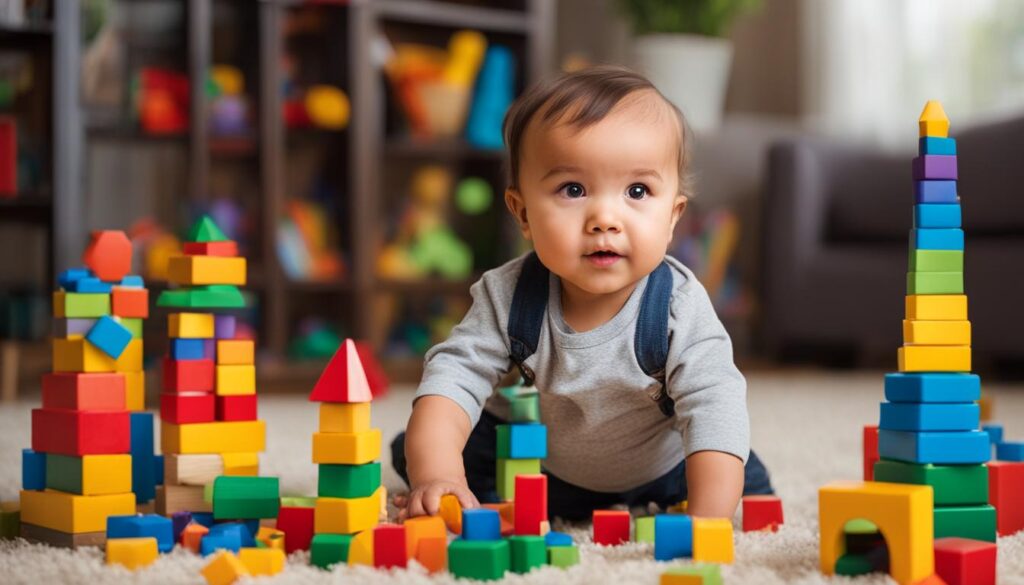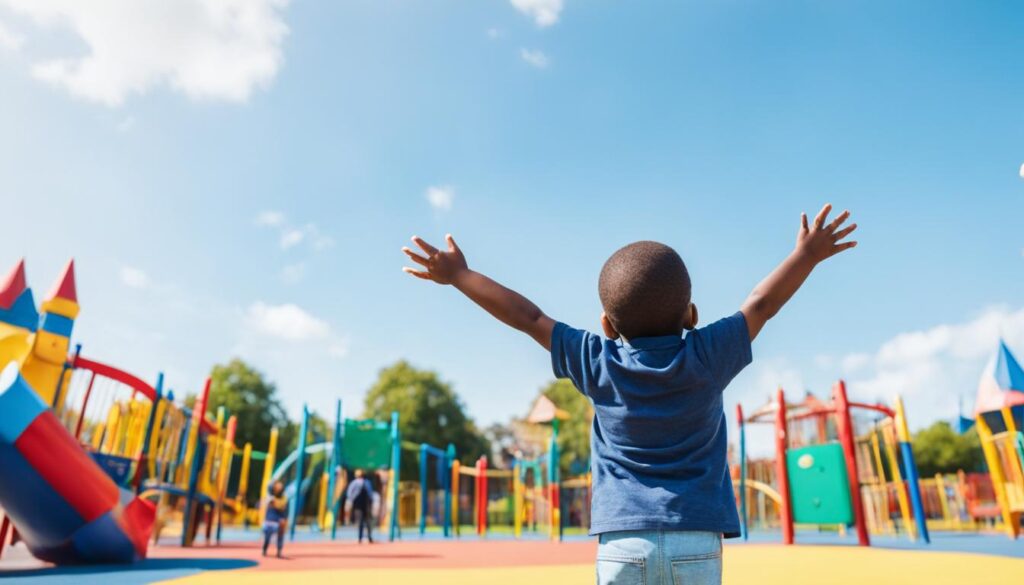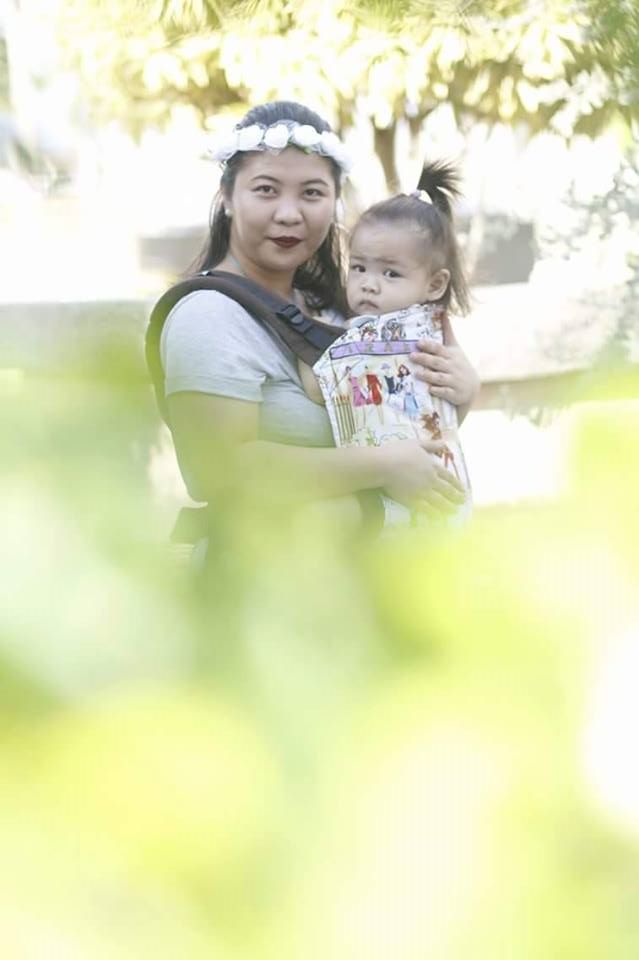As a dedicated parent, I’m acutely aware of the incredible developmental journey toddlers embark upon. Each day, their world blossoms with new skills, and what’s pivotal in this phase is not just learning these skills but the self-belief to apply them. I’ve seen firsthand how nurturing self-belief in toddlers and promoting self-assurance in young children lay a robust foundation for their future. So, I’m thrilled to share my personal insights into how to raise a confident toddler, a guide for fellow parents navigating the beautiful yet challenging waters of toddlerhood.

Key Takeaways
- Demonstrate optimism and show readiness when tackling new challenges with your toddler.
- Teach that setbacks are an opportunity for growth to instill resilience.
- Celebrate the mastery of new abilities to promote a sense of achievement.
- Encourage your toddler’s exploration of interests to foster a unique identity.
- Validate your toddler’s efforts, regardless of outcome, for intrinsic motivation.
- Understand that your confidence as a parent directly impacts your child’s self-belief.
The Psychology of Toddler Confidence
As a parent, witnessing the remarkable journey of a toddler’s rapid development is both exhilarating and monumental. The period of accelerated learning that toddlers experience is deeply interwoven with their burgeoning confidence. They eagerly soak up new knowledge and with each new skill they acquire, a matching degree of self-confidence naturally emerges.
Understanding Your Toddler’s Rapid Learning Phase
I’ve observed that toddlers have an incredible capacity for absorbing new information and abilities. During playtime, conversations, and daily routines, I see them making connections and understanding concepts that were foreign to them just days before. This intensive phase of brain development is critical not only for skill acquisition but also for developing confidence in toddlers, which aligns with their sense of independence and agency.
Why Confidence is as Important as Skills
Confidence underpins a child’s willingness to explore and their motivation to engage with the world around them. In my experience, a toddler’s assurance in their own abilities often encourages further learning and exploration, establishing a positive feedback loop. This is why I believe that nurturing confidence is as important, if not more, than the skills themselves for the holistic development of my child.
The Role of Mastery and Resilience in Building Self-Confidence
A key aspect of growing up is learning to face challenges and recover from setbacks. In developing resilience in young children, I focus on providing them with opportunities to practice skills to the point of mastery. Equally, when they falter, I am there to guide them through their emotions, reinforcing that setbacks are a natural part of learning and growth.
| Skill Set | Benefits for Confidence Development |
|---|---|
| Problem-Solving | Encourages independence and self-reliance |
| Communication | Boosts ability to express needs and thoughts clearly |
| Social Interactions | Builds trust and reciprocal relationships |
| Emotional Regulation | Teaches coping strategies and resilience |
By building a toddler’s self-esteem in these areas, I am effectively weaving a fabric of confidence that will envelop them as they grow, contributing to their social, emotional, and cognitive well-being. Fostering a secure, loving environment where they can safely experiment, learn, and succeed is the ultimate joy of parenting for me.
Incorporating Confidence into Your Parenting Style
Embracing confident parenting tips is not merely about what I teach but also about how I behave. Setting an example is crucial. My children look to me for cues on how to interact with the world, and I take this responsibility seriously. Instilling a mindset that embraces challenges, treats setbacks as natural, and values effort over outcome is vital. This approach is instrumental in fostering self-confidence in toddlers and laying the groundwork for a confident mindset that will serve them well throughout their lives.

Recognizing my own apprehensions and openly preparing for new experiences exemplifies the proactive attitude I want my children to adopt. When they see me mapping out strategies to tackle unforeseen tasks, they learn the value of preparedness and the positive impact it can have on outcome and self-esteem.
Modeling Optimism and Preparedness in New Tasks
Whether trying a new food or facing a playground adventure, I show my children that a cheerful and eager approach, coupled with ready-for-anything spirit, can turn unfamiliar situations into exciting opportunities for growth.
Teaching Kids to View Mistakes as Learning Opportunities
In our household, mistakes are not stumbling blocks but stepping stones to success. I reiterate to my little ones that every error is a chance to learn something new, ensuring that they build a confident mindset in toddlers that views every attempt, successful or not, as valuable.
Developing Resilience: Encouraging Perseverance and Effort
My parenting style centers around encouragement and resilience. When things don’t go as planned, I focus on the effort behind the attempt rather than the outcome. This tenet is at the heart of fostering self-confidence in toddlers; they learn that persistence is commendable and that effortless victories are less valuable than hard-won battles.
Children are not a distraction from more important work. They are the most important work. – C.S. Lewis
This quotation encapsulates my belief in the significance of the parental role in shaping confident, resilient characters in our children, and it keeps me centered on the goal of raising self-assured individuals.
Fostering Self-Discovery and Independence
Guiding my toddler toward an autonomous future involves more than just momentary decisions; it’s about laying a solid foundation for nurturing self-belief in toddlers that will sustain them as they grow. Balancing guidance with the freedom to explore is key in building a toddler’s self-esteem and promoting self-assurance in young children. The journey of self-discovery often starts with the sparks of curiosity in their eyes and the early choices they make.

Nurturing a Sense of Identity through Interests
Each toddler is a world of potential, brimming with unique likes, dislikes, and passions. As I watch my toddler gravitate toward certain activities, be it stacking blocks or doodling, I see the outlines of their identity taking shape. I make it my responsibility to cultivate these natural inclinations, by providing them with resources and experiences that align with their interests. This nurturing approach fosters a strong sense of self and encourages them to trust in their abilities.
Establishing and Achieving Personal Goals with Your Toddler
Witnessing my toddler set and achieve their very first goals is a delightful milestone. To make goal-setting a tangible concept, I create a visual Goals Chart that my toddler can interact with. Below is an example of the goals chart we use, focusing on simplifying tasks into small, achievable steps, instilling a sense of accomplishment with each progress.
| Goal | Steps | Achievement Timeline | Reward |
|---|---|---|---|
| Build a Tower | Stack 5 blocks | 1 Day | Extra storytelling time |
| Learn a New Word | Point and name an object | 1 Week | Visit to the park |
| Help with Chores | Put toys away after play | 2 Weeks | Choose dinner for one night |
By celebrating each small success and embracing the slip-ups as learning opportunities, I am seeing my toddler’s self-assurance bloom. Whether they’re mastering a new word or learning to cooperate during chores, these achievements are fundamental in building toddler’s self-esteem.
This dynamic approach of supporting their interests and guiding them towards setting and accomplishing their goals underpins the essence of confidently stepping into their own, promising a future filled with self-assured strides.
How to Raise a Confident Toddler
As a parent, my primary goal is understanding how to raise a confident toddler. It’s essential to display confident behavior as a parent, which serves as a living template for my child’s growing personality. By addressing setbacks with a nurturing attitude, I’m fostering a secure environment for learning and exploration. In my experience, the cornerstone of confident parenting tips involves the delicate balance of support and independence, allowing them to embrace both achievements and challenges.
Creating opportunities for my toddler to engage in a variety of experiences is crucial for their growth and self-discovery. It’s these experiences that guide them towards their passions and teach them resilience. Building my toddler’s self-esteem comes from allowing them to take healthy risks, make decisions, and experience the consequences in a supportive setting.

A key aspect of fostering their confidence is through goal setting. Setting realistic and achievable goals for my toddler and then celebrating the small victories along the way has shown to be highly effective. This practice not only solidifies their self-worth but also instills a sense of competence and the belief that they can influence the world around them.
“Raising a confident toddler does not mean they will be free from experiencing failure or difficulty. It means they will have developed the resilience to bounce back and learn from these experiences, emerging stronger and more self-assured.”
As each day presents new scenarios for character development, I incorporate subtle, everyday actions like affirming their feelings, rewarding curiosity, and providing consistent encouragement. This helps nurture a stable base from which my toddler can grow and become a confident individual. By deliberately nurturing their individual strengths and interests, I’m building a pathway towards raising an assured and capable future leader.
Validating Your Toddler’s Efforts and Achievements
When we talk about boosting toddler’s self-confidence, the conversation often turns to how we recognize their efforts and successes. As a parent, it’s critical for me to foster a supportive environment where my toddler feels celebrated for their hard work—not just their milestones.
The Power of Praise and Positive Reinforcement
By acknowledging every step my child takes towards a goal, I am instilling resilience in young children. A simple “I’m proud of you for trying!” goes a long way in developing confidence in toddlers. This consistent encouragement makes them more inclined to face challenges and persists in the face of adversity.
Assigning Age-Appropriate Responsibilities to Boost Self-Esteem
Introducing my toddler to responsibilities that they can manage not only instills a sense of accountability but also significantly boosts their self-esteem. These tasks, ranging from tidying up toys to choosing their clothes, offer tangible ways to demonstrate their growing independence and competences.
| Age | Responsibilities | Benefits |
|---|---|---|
| 2-3 years | Picking up toys, Feeding a pet | Organizational skills, Sense of care |
| 3-4 years | Making their bed, Setting the table | Basic chores, Family contribution |
| 4-5 years | Helping with groceries, Dressing themselves | Decision-making, Personal responsibility |
Teaching Realistic Self-Perception Beyond Social Media Comparisons
Part of nurturing a confident toddler entails teaching them to value their own achievements without drawing comparisons to others, especially in this digital age where social media can distort reality. I stress the importance of personal growth and celebrate their unique journey.
In my commitment to developing confidence in toddlers, I ensure that each day comes with opportunities for praise, new responsibilities, and realistic self-perception. It is not just about what my child does, but the internal strength they build while learning to navigate their world.
Conclusion
In the pursuit of nurturing self-belief in toddlers and promoting self-assurance in young children, we recognize the profound impact of a parent’s intentional approach. The essence of how to raise a confident toddler lies in molding an environment where confidence can thrive – one filled with optimism, preparation, and resilience. My journey as a parent is infused with a steadfast commitment to these principles, believing firmly that by empowering my child to embrace their unique identity, to boldly set and pursue their objectives, and to perceive challenges as avenues for growth, I am paving the way for lifelong self-confidence.
The value of positive reinforcement in this developmental arc cannot be overstated, distributing ample praise for effort and extending age-adapted responsibilities to elevate a toddler’s perception of their capabilities. Seated within an atmosphere that esteems these endeavors, young children glean a clear understanding that their value extends beyond their successes, fostering a secure and rooted sense of self-assurance. It’s about balancing high expectations with realistic frameworks that allow their confidence to unfold at a natural and nurturing pace.
Ultimately, the seed of confidence grows into a mighty tree when consistently watered with encouragement, understanding, and trust. As I look towards the horizon, my aspiration as a parent remains unshaken: to continue nurturing this fertile groundwork that supports the blossoming of a well-adjusted, self-assured individual, ready and equipped to navigate life’s diverse pathways with confidence and an appreciable measure of self-belief.
FAQ
How can I nurture self-belief in my toddler?
Nurturing self-belief in toddlers is about creating a positive environment where they feel secure and valued. It’s important to acknowledge and celebrate their efforts, encourage them to explore their interests, and provide plenty of opportunities for them to succeed in their endeavors. Be a supportive guide, take time to listen to their ideas, and offer constructive feedback that fosters their self-assurance.
What strategies can I use to promote self-assurance in my young child?
To promote self-assurance in young children, offer consistent support and affirmations. Let them make choices and encourage independence in safe and age-appropriate ways. Also, build a routine that includes ample time for play and exploration, which are key in building self-confidence. Furthermore, being a role model of confident behavior yourself can have a positive influence on your child.
What is the significance of confidence in my toddler’s development?
Confidence plays a crucial role in a toddler’s development as it empowers them to try new things, face challenges, and bounce back from setbacks. This self-confidence is intertwined with their learning process and helps them engage more effectively with the world around them, thereby enhancing their overall growth and development.
How does mastering skills and resilience contribute to my toddler’s self-esteem?
Mastering skills provides toddlers with a sense of achievement and competency, which in turn boosts their self-esteem. Additionally, resilience teaches them that setbacks are temporary and can be overcome, which is essential in building a strong and positive sense of self. This combination of skill mastery and resilience fosters a healthy self-image and belief in their own capabilities.
What are some confident parenting tips to help foster self-confidence in my toddler?
Confident parenting tips include setting a positive example, praising the process rather than the outcome, and encouraging problem-solving and decision-making skills. It’s also helpful to maintain a calm and consistent approach to discipline, express your belief in their abilities, and create a safe environment that allows for mistakes and personal growth.
How can I build a confident mindset in my toddler?
Building a confident mindset involves fostering a growth mindset where effort and learning from mistakes are valued. Encourage your toddler to take on new challenges, providing support along the way. Celebrate their successes and frame any failures as opportunities for growth. Encourage curiosity and the desire to learn, as these traits are closely linked to developing self-confidence.
How can I help my toddler develop resilience?
To help your toddler develop resilience, teach them to view challenges as opportunities. Encourage them to try again after a setback and reassure them that it’s okay to fail. Provide support and guidance, but resist the urge to solve all their problems for them. Instead, brainstorm solutions together and praise their efforts to persevere.
In what ways can I foster my toddler’s independence while still providing support?
Encouraging independence involves letting toddlers do tasks themselves, even if they make mistakes. Provide them with choices whenever possible, so they can learn decision-making skills. Moreover, involve them in daily routines and chores with age-appropriate responsibilities, and allow them to tackle problems while offering guidance when needed.
Why is it important to praise and reinforce positive behaviors in toddlers?
Praise and positive reinforcement are crucial because they help toddlers associate their actions with positive outcomes. This reinforcement encourages them to continue engaging in good behaviors and contributes to a sense of accomplishment and heightened self-esteem. Remember to be specific about what you are praising to reinforce desired behaviors effectively.
How can I balance giving my toddler responsibilities while ensuring they’re age-appropriate?
To balance responsibilities with age-appropriateness, start with simple tasks that your toddler can accomplish with little guidance, such as picking up toys or helping to set the table. Gradually increase the complexity of tasks as your child grows and shows a capacity to handle more. Always consider safety, their level of interest, and their ability to understand the task at hand.
What’s the best way to teach my toddler a realistic self-perception in today’s digital world?
Teach your toddler a realistic self-perception by nurturing an environment grounded in genuine experiences rather than digital perfection. Limit exposure to social media and discuss the difference between real-life and the often-highlighted portrayals online. Engage in activities that promote real-world interaction and skill development, and celebrate the uniqueness of your child without comparison to others.

Aine Austria is a content creator, freelancer, entrepreneur, essential oils educator, nacho lover, and mom to an adorable daughter. She helps aspiring mom bloggers and entrepreneurs launch their blog, alongside other money-making opportunities. Aine believes that everyone has a story to tell and that their experiences and talents can be shared with the world.
Aine’s passion for writing and sharing her knowledge with others started at a young age. Growing up, she always loved to read books, write stories, and express herself through words. She strongly believes that moms can still pursue their dreams and passions while raising a family, and she aims to inspire other moms to do the same through her work.
Leave a Reply